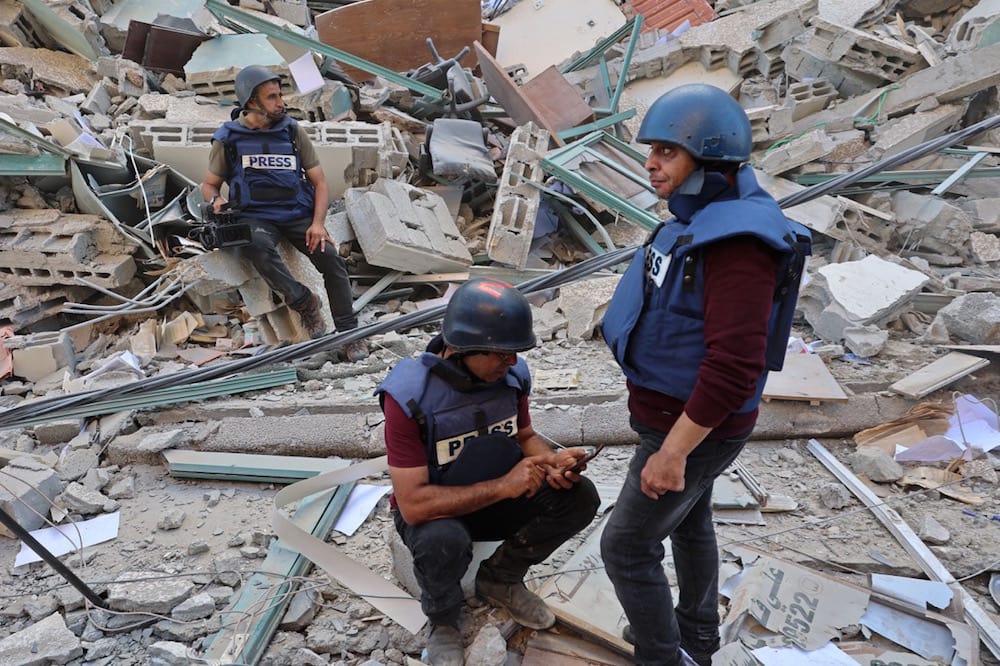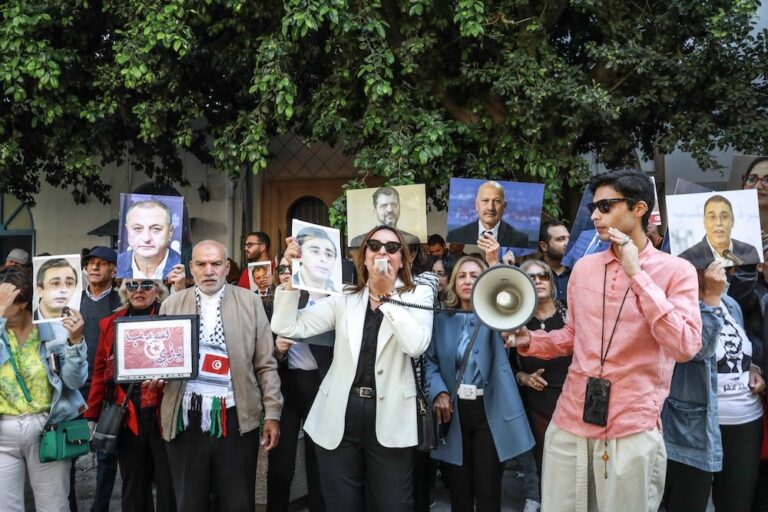May 2021 in Middle East and North Africa: A free expression roundup produced by IFEX's Regional Editor Naseem Tarawnah, based on IFEX member reports and news from the region.
Israel and social media platforms censor Palestinian voices, impunity for killings spark outrage in Iraq, and campaigns of repression in Egypt and Saudi Arabia continue unabated.
Silencing Palestinian voices
Front line journalists and activists throughout the occupied territories faced attacks and arbitrary detentions by Israeli forces while covering Palestinian demonstrations in recent weeks. Thousands of Palestinian protesters living in the occupied territories and in Israeli towns and villages have also been met with violent suppression and arrests. Demonstrators have been raising their voices against Israel’s growing system of apartheid, and settler-colonialism personified by the forced displacement of Palestinian residents in the occupied East Jerusalem neighbourhood of Sheikh Jarrah.
Israeli authorities have used administrative detentions without trials as a means of promoting a climate of fear and self-censorship, and suppressing coverage and documentation of protests where violations against demonstrators, activists, and journalists have been rife.
Despite calls for Israel to ensure a safe environment for journalists, the world watched surreal footage of Israeli airstrikes bombing al-Jalaa tower in Gaza – a 12-story building home to prominent media outlets like the Associated Press and Al-Jazeera – with journalists given only minutes to evacuate.
While the attack prompted rights groups like Amnesty International and Reporters Without Borders to call on the International Criminal Court to investigate it as a war crime, Israel bombed two more buildings in a single week, destroying the offices of at least 33 Palestinian and international media outlets. Journalists Yusef Muhammad Abu Hussein and Abdul Hamid Kulk were also killed in targeted bombings during the onslaught. IFEX member the Palestinian Center for Development and Media Freedoms (MADA) called for the perpetrators to be held accountable, warning that years of impunity have provided incentive for crimes committed against Palestinian media to continue.
In a historic resolution, the UN Human Rights Council moved to investigate Israel’s grave human rights violations against Palestinians on both sides of the Green Line. The resolution follows years of work by Palestinians and human rights defenders, some of whom provided first-hand testimony ahead of the vote, including Head of the Palestinian Journalists Syndicate (PJS), Nasser Abu Bakr, who called the bombing of media buildings in Gaza a “crime against humanity”.
Days after his testimony, Abu Bakr was removed from his job at Agence France Press (AFP) where he worked for over 20 years. According to the International Federation of Journalists, the dismissal came following the news agency’s concerns over Abu Bakr’s strong public defence of the rights of Palestinian journalists in his role as PJS president, in what the rights group called: “a clear case of victimization for his trade union activities, in contravention of the law and international standards”.
An online battle for the narrative
On the digital front-lines, activists and digital rights researchers have brought attention to an unprecedented wave of content takedowns and account suspensions by social media companies targeting pro-Palestinian online content. This includes content from activists documenting violations and war crimes, groups organizing demonstrations, or even posts and songs expressing solidarity with the Palestinian cause. Dozens of Palestinian journalists lost their contacts, conversations, and access to critical information, after WhatsApp blocked their accounts.
IFEX member The Arab Center for Social Media Advancement (7amleh) recorded over 500 digital rights violations against Palestinians in the span of two weeks. The digital rights group reported content and accounts being removed and restricted, hashtags hidden, and archived content deleted, with Instagram accounting for 50% of reported violations, followed by Facebook (35%), Twitter (11%), and TikTok (1%).
In a joint statement, 24 rights groups called on Facebook and Twitter to stop the systematic silencing of Palestinian voices online, reinstate censored accounts and content, and commit to a transparent decision-making process. The rights groups called the latest online censorship “part of a wider pattern of consistent censorship of Palestinian and allied voices and systematic efforts to silence them,” pointing to the critical documentation of civil society organizations like 7amleh.
Collaboration between social media companies and Israeli authorities has fuelled the indiscriminate censorship of Palestinian content, with Facebook accepting 81% of requests made by Israel’s Cyber Unit, and Twitter suspending tens of accounts of Palestinian users based on information from the Israeli Ministry of Strategic Affairs, according to 7amleh’s annual report.
‘Who killed me?’: Iraqis demand justice for killings
A new wave of killings targeting activists has unfolded in Iraq, signifying the chilling state of free expression in the country. The recent killing of prominent Karbala-based activist Ihab al-Wazni ignited public outcry with thousands of protesters taking to the streets to voice their anger at the rise in extrajudicial killings and culture of impunity.
Peaceful demonstrators in Baghdad’s Tahrir Square were met with violent suppression by security forces resulting in deaths and injuries. Online, the hashtag “who killed me?” saw netizens posting photos of slain activists and demanding their perpetrators be held accountable.
Meanwhile, an Iraqi Kurdish court upheld the 6-year jail terms for journalists Sherwan Sherwani and Guhdar Zebari who were found guilty of “endangering the national security of the Kurdistan region” earlier this year in a trial defence lawyers and human rights advocates allege was flawed with the journalists being subjected to torture and forced to sign confessions.
Egypt’s unchecked repression
Egypt’s relentless clampdown on free expression shows no signs of receding. Judicial authorities continued their heavy-handed prosecution of young women online influencers for publishing content on social media platforms TikTok and Likee that flaunt conservative norms.
Meanwhile, columnist Gamal al-Gamal’s health has seriously deteriorated during his pretrial detention in Cairo’s Tora Prison on charges of spreading false news, joining a terrorist organization, and inciting public opinion against state institutions. Prosecuted on similar fabricated charges are some 28 journalists that remain behind bars for their work, including Shaima Sami, and more recently, retired journalist Tawfiq Ghanem.
Civil society organizations continued to pursue accountability for Egypt’s state of repression. Five leading human rights organizations in the country called for the urgent implementation of seven necessary measures to end the unprecedented deterioration in human rights. Rights groups also expressed their concern over the Biden administration’s plans to send $1.3 billion in US military aid to the country next year despite the US President’s campaign promises last year of “no more blank checks” to Egypt.
In a joint statement, 64 rights groups from around the world called on President Abdel Fattah al-Sisi to immediately end the ongoing crackdown on freedom of association, independent groups, and peaceful dissent. The rights bodies called for the release of Egypt’s prisoners of conscience, independent and effective investigations into human rights violations, a moratorium on executions, as well as putting a stop to sexual and gender-based violence, and ending the arbitrary arrests and prosecutions of LGBTQI+ people.
Saudi Arabia: Doubling down on its human rights record
Twice as many harsh sentences on Saudi prisoners of conscience were issued in April than in the first three months of the year combined, said human rights organization Grant Liberty. The group called the renewed crackdown on political prisoners a result of the Biden administration’s failure to impose sanctions on the crown prince, with the resulting impunity giving Saudi authorities carte blanche to punish its imprisoned critics. Despite releasing some prominent activists earlier in the year, a campaign of repression continues to see the systematic persecution and silencing of human rights defenders and activists.
Civil society organizations have pointed to Saudi Arabia’s recent track record of repression of all public dissent as evidence of the country being an unsafe country to host Google’s Cloud services. The tech giant’s move to establish a “Cloud region” in the kingdom has been met with immense push-back from rights groups, who called on Google to withdraw its plans, noting Saudi Arabia’s record of “alleged espionage and infiltration of technology platforms, use of cyber surveillance software to spy on dissidents, and a notorious justice system that flagrantly violates due process rights.”
In Brief
Authorities in Algeria continue to violate the right to assembly and free expression of Hirak protesters and media covering the ongoing demonstrations. Reporter Kenza Khattou and at least 16 other journalists on the protest front-lines faced brief detentions, while hundreds of protesters were also arrested during the weekly demonstrations, as security forces moved to suppress the pro-democracy movement. In the increasingly hostile environment for the right to protest and free expression, ARTICLE 19 called new requirements mandating advanced notification for protests represent yet another effort by authorities to silence criticism.
In Oman, peaceful demonstrators and activists were targeted with tear gas by security forces and arbitrary detentions following rare protests against economic conditions. According to the Gulf Centre for Human Rights (GCHR) and the Omani Association for Human Rights (OAHR), dozens of protesters were forced to sign pledges promising not to participate in future demonstrations.
In Qatar, authorities forcibly disappeared and detained migrant rights activist and blogger Malcolm Bidalli, holding him in solitary confinement for three weeks without charges. Bidalli, a Kenyan national, was eventually charged with receiving foreign funds to spread disinformation about the country, and has since been released. Meanwhile, rights groups called on the Emir of Qatar to end travel bans unjustly imposed on five citizens, including prominent human rights lawyer Najeeb Al-Nuaimi.
New & Noteworthy
Lebanon: A new study from Maharat Foundation examined media trends in Lebanon in the year following the October 2019 revolution, including the media’s role in holding authorities accountable for protester demands, and the growing role of alternative media and online free expression in shaping public discourse.
Bahrain: The “culture of impunity” the country’s national human rights bodies were supposed to address remains pervasive since their establishment, says a new report from Bahrain Center for Human Rights, pointing to their lack of independence and the absence of active participation from civil society in appointments.
Egypt: The Association of Free of Thought and Expression (AFTE) examined how the government can end its encroaching policy of mass surveillance that has resulted in the arrest and prosecution of hundreds of social media users for their digital content.



